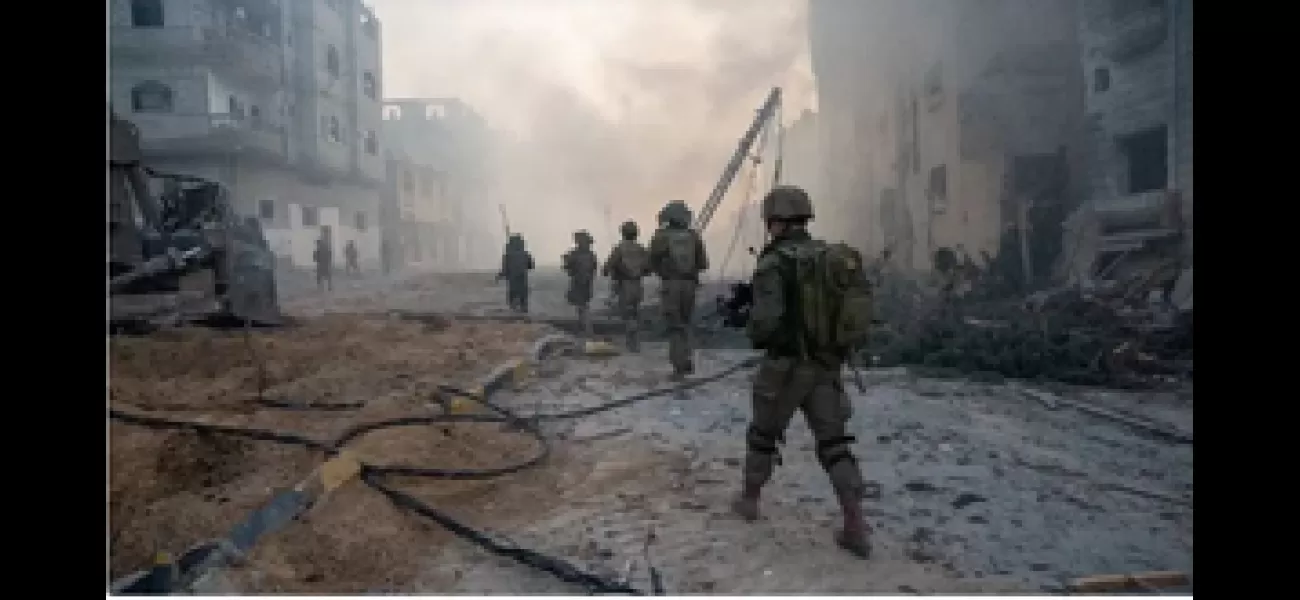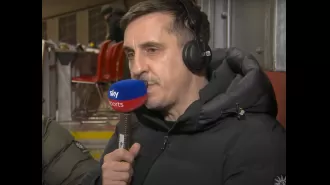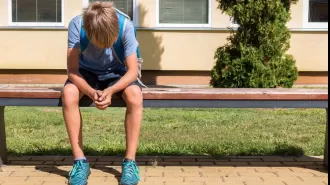Israel is working to manage the consequences of allies backing the ICC prosecutor's warrant requests.
Israel tries to handle repercussions of top war crimes court prosecutor's request for arrest warrants for Israeli and Hamas leaders, supported by France, Belgium, and Slovenia.
May 21st 2024.

On Tuesday, Israel was facing a difficult situation as the International Criminal Court's chief prosecutor, Karim Khan, requested arrest warrants for Israeli and Hamas leaders for war crimes. This request was supported by three European countries, including France, which is a key ally of Israel.
The three countries, Belgium, Slovenia, and France, expressed their support for the decision made by Khan. The prosecutor accused Israeli Prime Minister Benjamin Netanyahu, Defence Minister Yoav Gallant, and three Hamas leaders - Yahya Sinwar, Mohammed Deif, and Ismail Haniyeh - of committing war crimes and crimes against humanity in the Gaza Strip and Israel.
Although no one is currently facing immediate arrest, this announcement has further isolated Israel globally, especially as it faces criticism from its closest allies for its actions in Gaza. The support for the arrest warrants from three European Union countries has also revealed divisions in how the West approaches Israel.
In response to the prosecutor's decision, Israeli Foreign Minister Israel Katz traveled to France on Tuesday for meetings that could potentially shape how countries will handle the warrants, if they are eventually issued. The outcome of these meetings could also determine if there is a threat to Israeli leaders.
Despite facing challenges regarding the warrants, Israel still has the support of its top ally, the United States, as well as other Western countries that have spoken out against the decision. However, if the warrants are issued, it could complicate international travel for Netanyahu and Gallant, even though they are not at immediate risk of prosecution as Israel is not a member of the International Criminal Court.
As Israeli leaders grappled with the prosecutor's decision, violence continued in the region. An Israeli raid in the occupied West Bank resulted in the deaths of at least seven Palestinians, including a local doctor, according to Palestinian health officials.
In a statement on Monday night, France expressed its support for the International Criminal Court, its independence, and the fight against impunity in all situations. The statement also emphasized the importance of strict compliance with international humanitarian law and the need to address civilian casualties and humanitarian access in the Gaza Strip.
The war between Israel and Gaza began on October 7, when Hamas-led militants crossed into Israel and killed around 1,200 people, mostly civilians, and held 250 people hostage. Khan has accused Hamas leaders of committing crimes against humanity, including murder, extermination, and sexual violence.
In response, Israel launched an offensive that has resulted in the deaths of over 35,000 Palestinians, according to Gaza's Health Ministry. The war has also caused a humanitarian crisis, displacing many people in the coastal enclave and leading to starvation, which Khan described as a "method of warfare" used by Israel.
Belgian Foreign Minister Hadja Lahbib stated that "crimes committed in Gaza must be prosecuted at the highest level, regardless of the perpetrators." This sentiment was echoed by other countries, including the United Kingdom, which criticized the move as "not helpful" and stated that the International Criminal Court does not have jurisdiction in this case.
Netanyahu and other Israeli leaders condemned the prosecutor's actions as disgraceful and antisemitic. US President Joe Biden also spoke out against the prosecutor and supported Israel's right to defend itself against Hamas. The Czech Republic, a close ally of Israel, also called the prosecutor's decision "appalling and completely unacceptable."
A panel of three judges will now decide whether to issue the arrest warrants and allow the case to proceed. This process typically takes two months.
Experts have warned that if the warrants are issued, it could complicate Israel's relations with its allies. Yuval Kaplinsky, a former senior official in Israel's Justice Ministry, stated that countries that are party to the International Criminal Court would be obligated to arrest Netanyahu or Gallant if they visit. However, some of these countries may try to find legal loopholes to avoid this.
Since the war began, there has been an increase in violence in the occupied West Bank. On Tuesday, an Israeli raid in the Jenin refugee camp and the adjacent city of Jenin resulted in the deaths of at least seven Palestinians, according to the Palestinian Health Ministry. The Israeli military claimed that they were targeting militants, while the Palestinian Islamic Jihad militant group stated that their fighters engaged in battle with Israeli forces.
Tragically, among the dead was Ossayed Kamal Jabareen, a surgery specialist at Jenin Governmental Hospital. He was killed on his way to work, according to Wissam Abu Baker, the hospital's director. Jenin and the refugee camp have been frequent targets of Israeli raids, even before the war with Hamas in Gaza began.
There has been a significant increase in attacks by Palestinians on Israelis, which Israel attributes to a rise in militancy in the occupied West Bank. As a result, over 3,000 Palestinians have been arrested since the start of the war in Gaza.
Israel captured the West Bank, along with east Jerusalem, in the 1967 Mideast war and later annexed it. They also withdrew troops and settlers from the Gaza Strip in 2005. Palestinians hope to have these territories as part of their future independent state, but their hopes have been diminished since the war in Gaza began.
The three countries, Belgium, Slovenia, and France, expressed their support for the decision made by Khan. The prosecutor accused Israeli Prime Minister Benjamin Netanyahu, Defence Minister Yoav Gallant, and three Hamas leaders - Yahya Sinwar, Mohammed Deif, and Ismail Haniyeh - of committing war crimes and crimes against humanity in the Gaza Strip and Israel.
Although no one is currently facing immediate arrest, this announcement has further isolated Israel globally, especially as it faces criticism from its closest allies for its actions in Gaza. The support for the arrest warrants from three European Union countries has also revealed divisions in how the West approaches Israel.
In response to the prosecutor's decision, Israeli Foreign Minister Israel Katz traveled to France on Tuesday for meetings that could potentially shape how countries will handle the warrants, if they are eventually issued. The outcome of these meetings could also determine if there is a threat to Israeli leaders.
Despite facing challenges regarding the warrants, Israel still has the support of its top ally, the United States, as well as other Western countries that have spoken out against the decision. However, if the warrants are issued, it could complicate international travel for Netanyahu and Gallant, even though they are not at immediate risk of prosecution as Israel is not a member of the International Criminal Court.
As Israeli leaders grappled with the prosecutor's decision, violence continued in the region. An Israeli raid in the occupied West Bank resulted in the deaths of at least seven Palestinians, including a local doctor, according to Palestinian health officials.
In a statement on Monday night, France expressed its support for the International Criminal Court, its independence, and the fight against impunity in all situations. The statement also emphasized the importance of strict compliance with international humanitarian law and the need to address civilian casualties and humanitarian access in the Gaza Strip.
The war between Israel and Gaza began on October 7, when Hamas-led militants crossed into Israel and killed around 1,200 people, mostly civilians, and held 250 people hostage. Khan has accused Hamas leaders of committing crimes against humanity, including murder, extermination, and sexual violence.
In response, Israel launched an offensive that has resulted in the deaths of over 35,000 Palestinians, according to Gaza's Health Ministry. The war has also caused a humanitarian crisis, displacing many people in the coastal enclave and leading to starvation, which Khan described as a "method of warfare" used by Israel.
Belgian Foreign Minister Hadja Lahbib stated that "crimes committed in Gaza must be prosecuted at the highest level, regardless of the perpetrators." This sentiment was echoed by other countries, including the United Kingdom, which criticized the move as "not helpful" and stated that the International Criminal Court does not have jurisdiction in this case.
Netanyahu and other Israeli leaders condemned the prosecutor's actions as disgraceful and antisemitic. US President Joe Biden also spoke out against the prosecutor and supported Israel's right to defend itself against Hamas. The Czech Republic, a close ally of Israel, also called the prosecutor's decision "appalling and completely unacceptable."
A panel of three judges will now decide whether to issue the arrest warrants and allow the case to proceed. This process typically takes two months.
Experts have warned that if the warrants are issued, it could complicate Israel's relations with its allies. Yuval Kaplinsky, a former senior official in Israel's Justice Ministry, stated that countries that are party to the International Criminal Court would be obligated to arrest Netanyahu or Gallant if they visit. However, some of these countries may try to find legal loopholes to avoid this.
Since the war began, there has been an increase in violence in the occupied West Bank. On Tuesday, an Israeli raid in the Jenin refugee camp and the adjacent city of Jenin resulted in the deaths of at least seven Palestinians, according to the Palestinian Health Ministry. The Israeli military claimed that they were targeting militants, while the Palestinian Islamic Jihad militant group stated that their fighters engaged in battle with Israeli forces.
Tragically, among the dead was Ossayed Kamal Jabareen, a surgery specialist at Jenin Governmental Hospital. He was killed on his way to work, according to Wissam Abu Baker, the hospital's director. Jenin and the refugee camp have been frequent targets of Israeli raids, even before the war with Hamas in Gaza began.
There has been a significant increase in attacks by Palestinians on Israelis, which Israel attributes to a rise in militancy in the occupied West Bank. As a result, over 3,000 Palestinians have been arrested since the start of the war in Gaza.
Israel captured the West Bank, along with east Jerusalem, in the 1967 Mideast war and later annexed it. They also withdrew troops and settlers from the Gaza Strip in 2005. Palestinians hope to have these territories as part of their future independent state, but their hopes have been diminished since the war in Gaza began.
[This article has been trending online recently and has been generated with AI. Your feed is customized.]
[Generative AI is experimental.]
0
0
Submit Comment





